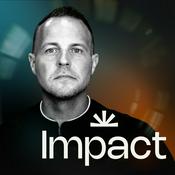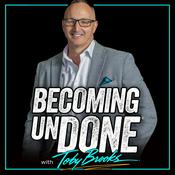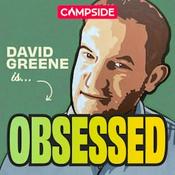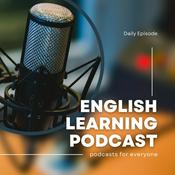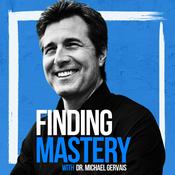74 episodes
Ep. 74 - Charity Stutzman: Future Proofing Student Wellbeing with Data Driven Prevention
2/13/2026 | 32 mins.Charity Stutzman, Senior Director of Higher Education Strategy at Vector Solutions, unpacks the groundbreaking findings from the latest Campus Prevention Network National Insights Report.
With over 15 years in student affairs—including as Assistant Dean of Students at the University of Texas at Arlington—Charity brings a frontline perspective to a dramatic cultural shift: students are increasingly choosing not to drink, driven by mental health, finances, and a desire for control.
They dive into what this means for prevention work, the rise of cannabis use, and how campuses can move from fear-based messaging to support, belonging, and skill-building. Charity also shares how tools like AlcoholEdu and CannabisEdu provide real-time data to help institutions respond proactively, and why tying student wellbeing directly to career readiness is the future of higher ed strategy.
For anyone in student affairs, prevention, or institutional leadership, this conversation is an essential look at the data reshaping student success.
Key Takeaways
A Rapid Cultural Shift is Underway – The number of students abstaining from alcohol has jumped significantly in just two years, with 64% of incoming students citing negative health consequences as a reason—up from 55% in 2023. Younger students are driving this change, breaking long-held stereotypes about college drinking culture.
Prevention Must Shift from Risk Reduction to Reinforcement – With more students already making healthy choices, campuses should focus on reinforcing positive behaviors, building skills, and creating environments that support wellbeing—not just warning about risks.
Cannabis Use Presents a Dual Challenge & Opportunity – As cannabis becomes legal and socially normalized, institutions need to provide education on safety, mental health connections, and risk reduction, tailored to their state and campus environment.
Protective Factors Are Stacking Up – Students are prioritizing mental health, tight friend groups, financial pressure, and academics—making not drinking a logical choice. Campuses can leverage this by promoting healthy hubs like campus recreation centers.
See Students as Whole Individuals – Support must move beyond isolated behaviors to address the mix of stress, identity, finances, and academic pressure. This requires breaking down silos and adopting a case-management approach to student care.
Data-Driven Tools Enable Real-Time Insight – Platforms like Alcohol EDU and Cannabis EDU give campuses real-time data, benchmarking, and tailored pathways (e.g., for abstainers or survivors), helping them spot trends and adjust support before issues escalate.
Upskill Faculty & Staff for Holistic Support – Faculty and staff should be trained to engage students across the eight dimensions of wellness and refer them appropriately, creating safe, supportive touchpoints throughout the student journey.
Be Ready to Pivot Quickly – Higher ed moves slowly, but today’s student trends shift fast. Institutions need mechanisms to adapt policies, programs, and resources swiftly—even when outcomes are uncertain—to stay relevant and responsive.
Find Charity Stutzman:
LinkedIn
https://www.linkedin.com/in/charity-stutzman-9a4a1121/
Vector Solutions
https://www.vectorsolutions.com/
And find EdTech Connect here:
Web: https://edtechconnect.com/
Chapters
(00:00:00) - The rising number of students drinking
(00:00:51) - EdTech Connect: Campus Prevention Network National Insights
(00:02:22) - The Vital Moment of My College Experience
(00:05:34) - In the Elevator with Higher Ed Strategy
(00:08:09) - CPN National Insights Report
(00:14:12) - Protective Factors for Student Wellbeing
(00:19:56) - About the Vector Solutions Training Tools
(00:22:37) - What kinds of success stories have been reported from institutions that have implemented
(00:25:19) - What Obstacles Are Higher Ed Students Running Into?
(00:26:33) - Student Affairs Teams Need to Be More Empowered
(00:28:58) - Top Higher Ed Leaders: Future Proofing Student Support Systems
(00:31:21) - EdTech Connect- Ben Tasker, an expert in AI, workforce readiness and skills-based learning, shares his unique journey from higher education to industry, exploring how AI is reshaping learning and work during what he calls the "AI between times"—a transitional era of rapid change and "uh-oh moments."
They dive into why AI amplifies human capability rather than replacing it, how institutions can ethically integrate AI, and the urgent need to shift from time-based degrees to skills-based outcomes.
Whether you're in higher ed, corporate training, or just thinking about the future of learning, this conversation offers actionable insights and a hopeful vision for an AI-enabled, accessible, and human-centered education system.
Key Takeaways
We’re in the "AI Between Times": A transitional period where AI is rapidly evolving, but the full "AI future economy" hasn’t arrived. This phase will include both breakthroughs and "uh-oh moments," like failed automation and deepfake risks.
AI Amplifies, Doesn’t Replace: Companies that lay off staff for AI often hire them back (and more) when point solutions fail. Successful organizations combine AI adoption with upskilling, leading to 52% higher profitability.
Shift from Time-Based to Skills-Based Learning: Traditional degree timelines are too slow for AI-paced change. Microcredentials, project-based learning, and skills validation are becoming critical for workforce readiness.
Embed AI Responsibly & Early: Ethical AI and governance should be established before implementation. This includes transparency, accountability, fairness, and cross-functional steering committees to mitigate risks.
AI in Education: Risk & Opportunity: While AI poses risks (e.g., student over-reliance, misinformation), embedding AI tools into learning platforms can accelerate learning, provide 24/7 tutoring, and improve outcomes—like students learning coding 8 weeks faster.
Human-Centered AI Projects Succeed: The most successful AI initiatives—whether in healthcare, education, or enterprise—integrate human elements: understanding user needs, ethical considerations, and real-world impact.
Start with a Personal Learning Plan: Educators and leaders should begin their AI journey by mapping their current skills, identifying desired skills, and using AI as a tool for personalized learning and productivity.
The Future is Accessible & Personalized: AI will make education more accessible, personalized, and continuous. Institutions must adapt to stay relevant, embedding AI across curricula and focusing on competency over credit hours.
Find Ben Tasker:
LinkedIn
https://www.linkedin.com/in/bentaskerai/
National Grid
https://www.nationalgrid.com/
And find EdTech Connect here:
Web: https://edtechconnect.com/
Chapters
(00:00:00) - This is the AI Between Times
(00:00:45) - Interview: Ben Tasker on the Future of Learning
(00:02:02) - Deep learning and data science: The science of AI
(00:03:15) - The AI 'Between Times'
(00:07:28) - What is Upskilling and Reskilling?
(00:10:28) - Will AI Replace Jobs?
(00:12:41) - The Future of AI in Higher Ed
(00:15:28) - Goodbye AI, Hello Governance
(00:17:53) - Post-Skills Based Learning
(00:20:04) - Healthcare, Higher Ed: The AI Success Stories
(00:22:00) - The Need for Ethics in AI
(00:25:05) - What emerging trend in AI and Learning
(00:26:28) - How to Apply AI to Student Learning - Jeff Dillon sits down with Michelle Craig, Director of Marketing and Commercial Operations at AppsAnywhere, to explore the seismic shifts happening in higher education as Generation Alpha prepares to enter college.
With two decades of experience at companies like Blackboard, QS Unisolution, and Job Teaser, Michelle shares insights from her groundbreaking research into Gen Alpha—students born between 2010 and 2025. They discuss how this "Generation AI" is already using tools like ChatGPT, why 56% expect hybrid learning to be the norm, and the critical challenges institutions face around equity, access, and digital transformation.
From rethinking IT strategy to marketing in the EdTech space, this conversation is a must-listen for anyone preparing for the future of student success.
Key Takeaways
Generation Alpha is “Generation AI” – The first Gen Alpha students will enter higher ed in 2028. Born alongside the iPad and Siri, they are early adopters of AI, with 73% already using or planning to use AI tools. However, they are also acutely aware of tech's downsides, with 72% worried about online safety and data security.
Hybrid Learning is the New Baseline – 56% of Gen Alpha believes higher education should be offered in a hybrid format. They expect flexibility to learn anytime, anywhere, driven by personal circumstances like work schedules and the normalization of remote environments.
Tech Equity is a Defining Challenge – 96% of Gen Alpha expects institutions to provide the devices and software needed to succeed. Equity isn't just an ideal—it's an operational necessity. Institutions must centralize IT, use data to optimize resources, and ensure access is agnostic of device or location.
Institutions Must Set Clear AI Guidelines – With AI use already common in K-12, colleges need to establish clear policies on acceptable use, provide approved AI tools in centralized platforms (like Apps Anywhere), and offer guidance to prevent confusion around plagiarism or cheating.
Student Satisfaction Will Hinge on Seamless Digital Experiences – Gen Alpha’s expectations for digital experiences include fast performance, easy navigation, and high-speed Wi-Fi as a given. Institutions will be judged on their ability to deliver consistent, high-quality interactions across physical and digital spaces.
Marketing in EdTech Requires Patience & Partnership – Selling to higher ed is not like selling to startups. Buying cycles are longer, stakeholders are layered, and success depends on building long-term partnerships, co-designing solutions, and aligning with institutional mission—not just pushing product.
The Pace of Change is Accelerating – Digital transformation in higher ed is happening faster than ever. Institutions must become more agile, data-informed, and student-centric to keep up with technological and generational shifts.
Centralization and Agnostic Systems Are Key – To support diverse device ecosystems (BYOD) and evolving software needs, IT departments should aim for centralized, agnostic platforms that provide equitable access, reduce waste, and simplify management.
Find Michelle Craig:
LinkedIn
https://www.linkedin.com/in/michelle-craig-4a186312/
AppsAnywhere
https://www.appsanywhere.com/
And find EdTech Connect here:
Web: https://edtechconnect.com/
Chapters
(00:00:00) - Gen X and the Code Generation
(00:00:48) - Michelle Craig
(00:02:02) - Top Executives: What Surprises Me About Generation Alpha
(00:04:42) - What's been consistent across your experiences in higher education?
(00:07:38) - Gen Alpha research from Apps Anywhere
(00:11:11) - The Future of Higher Education: Artificial Intelligence
(00:14:12) - Gen Alpha: The hybrid learning landscape
(00:15:22) - College IT: Apps anywhere, for Students
(00:17:09) - What's the Tech Trend we're Ignoring?
(00:18:40) - Top Higher Ed Executives: Digital Transformation Challenges
(00:20:08) - How to Prepare for a Digital Student Experience?
(00:24:35) - Marketing in Higher Ed: The challenges
(00:30:22) - EdTech Connect Ep. 71 - Jen Jenkins: What Online Universities Can Teach Campus Leaders About Digital Experience
1/23/2026 | 24 mins.Jen Jenkins, Director of Digital Experience at Western Governors University, brings a unique background that spans theater arts, healthcare content strategy, and higher ed—all centered on understanding user needs. She shares how her work at University of Utah Health shaped her approach to empathy-driven content, and how she now applies those lessons to WGU’s student-obsessed, competency-based model. Jen dives into the challenges of aligning academics with content strategy, how SEO is shaping degree offerings, and why institutions must move toward omni-channel consistency.
She also unpacks the technical shifts every content professional must understand—from bot traffic to headless CMS—and offers practical advice for universities and healthcare organizations ready to rethink their digital presence.
Whether you’re in content, marketing, or digital strategy, this conversation is packed with actionable insights for a human-first digital future.
Key Takeaways
Content Strategy in Healthcare vs. Higher Ed – Both involve high-stakes, life-changing decisions. Healthcare content focuses on easing anxiety and building emotional comfort, while higher ed content is about empowerment and selling a future.
WGU’s Model is Built for Access & Flexibility – As a fully online, competency-based university, WGU serves over 200,000 students by allowing them to test through material they already know—making education accessible regardless of location or schedule.
SEO Informs Academic Program Development – Search behavior doesn’t just drive traffic; it helps identify demand for new degrees and ensures content meets users where they are, using the language they actually search for.
Consistency Across Channels is Non-Negotiable – With the rise of generative AI and omni-channel touchpoints, brand messaging must be unified everywhere—from websites to AI-generated answers—to build trust and clarity.
Content Teams Need Technical Literacy – Content professionals must understand analytics, algorithm changes, bot traffic, and content delivery infrastructure (like CDNs) to protect performance and adapt quickly.
Pod-Based Collaboration Breaks Down Silos – Jen’s team uses a “pod” model with content leads, writers, SEO specialists, UX experts, and analysts working together instead of siloed, man-to-man efforts.
Headless CMS Enables Omni-Channel Agility – While challenging to implement, a headless content management system allows content to flow seamlessly across platforms and future-proofs digital experiences for evolving student needs.
Start with an Audit & Clear Priorities – Before revamping digital strategy, institutions should conduct a full content and user audit, identify priority audiences, and align resources to both “keep the lights on” and drive toward future goals.
Find Jen Jenkins:
LinkedIn
https://www.linkedin.com/in/jenjenkins/
Western Governors University
https://www.wgu.edu/
And find EdTech Connect here:
Web: https://edtechconnect.com/
Chapters
(00:00:00) - What's a Web Student's Must-Have Skills
(00:00:38) - EdTech Connect Podcast
(00:02:04) - How Content Strategy Is Influenced by the Arts
(00:04:10) - The Content Shift From Medical to Higher Ed
(00:07:22) - WGU's Digital Environments
(00:08:44) - How to Win Over Skeptics With Content Projects
(00:09:45) - How WGU spots demand for new degrees
(00:10:47) - WGU's Digital Strategy
(00:14:37) - What to Expect from WGU Online Student Experience
(00:15:32) - How Content Strategy Is Being Shaped by GEO and AI
(00:17:38) - How to Build a Content Professional's Team
(00:19:46) - Will Headless Make a Bigger Difference for Student Experience?
(00:22:14) - An Audition of Digital Content StrategyEp. 70 - Sharon Harrison: How AI Support is Becoming the New Front Door of Higher Education
1/16/2026 | 33 mins.In this episode of EdTech Connect, host Jeff Dillon sits down with Sharon Harrison, CMO at Gravyty, to explore the dramatic evolution of AI in higher education. Sharon, who played a key role in unifying the leading platforms Ivy.ai and Ocelot under the Gravyty brand, traces the journey from the early days of simple "chat boxes" to today's sophisticated conversational AI agents.
They discuss how this technology has shifted from a novelty to mission-critical infrastructure, helping schools tackle urgent challenges like summer melt, the enrollment cliff, and 24/7 multilingual support. Sharon shares surprising use cases, from addressing student food insecurity with empathy to uncovering actionable recruitment insights from chatbot data. The conversation dives deep into practical questions: How do you measure true ROI beyond simple deflection counts? What does "hybrid AI" really mean for seamless student support? And, crucially, what guardrails must institutions have for data privacy, accessibility, and bias? For any campus leader wondering where to start with AI, this episode is a masterclass in strategy, integration, and impact.
Key Takeaways
AI Has Evolved from "Chat Box" to Core Infrastructure: Conversational AI in higher ed has rapidly progressed from a simple FAQ tool ("chat box") to a virtual assistant, and is now moving toward autonomous AI agents. This shift, accelerated by COVID and the enrollment cliff, makes AI a strategic necessity, not a novelty.
The "Why" is Democratizing Access & Solving Urgent Pain Points: The most powerful AI use cases solve critical institutional pain points while democratizing access. Examples include providing 24/7 support for time-pressed families completing FAFSA, offering shame-free access to basic needs resources, and proactively engaging at-risk students before they fall through the cracks.
True ROI is Measured in Impact, Not Just Volume: Success metrics must go beyond "questions answered." Institutions should focus on deflected calls translated into staff hours and salary savings, increased application submission rates, shortened student worker onboarding, and uncovering demographic insights for targeted recruitment.
"Hybrid AI" is the Key to Safe, Effective Conversations: Modern chatbots use a hybrid algorithm that blends retrieval-based AI (for accurate, curated answers from the institution's knowledge base) with generative AI (for a natural, conversational flow). This approach provides guardrails, ensures brand-aligned tone, and prevents hallucinations.
Integration Over Replacement: Successful AI doesn't replace existing systems (CRM, SIS, LMS); it sits on top of them. The goal is to unify fragmented data, make legacy investments more valuable, and provide a seamless, single point of contact for the student across all campus silos.
Critical Guardrails: Ask "How," Not Just "If": When vetting AI vendors, leaders must ask how the AI works. Key safeguards include ensuring the AI is grounded only in the institution's content (not the open web), verifying current VPAT/accessibility compliance and SOC 2 certification, and thoroughly understanding data privacy and FERPA adherence.
Drive Adoption to Realize Value: Simply deploying a chatbot isn't enough. Institutions must proactively drive student adoption through social media campaigns, commercials, and integration into student workflows to achieve the deflection and engagement metrics that deliver ROI.
Start with an Internal Audit: For smaller institutions or those just beginning, the best first step is an internal audit. Discover what tools and systems already exist across campus departments. Leveraging existing, vetted contracts can speed up procurement and ensure smoother int...
Chapters
(00:00:00) - EdTech Connect: The Fear of Confessing
(00:01:01) - Meet Sharon Harrison, Chief Marketing Officer at Gravity
(00:02:36) - In the Elevator of Higher Ed: Ivy AI
(00:04:18) - The Merger of Ivy, AI and Ocelot
(00:05:31) - Chatbots' evolution in higher ed
(00:09:21) - AI Use Cases for Colleges
(00:11:54) - How to Build an AI-enabled Campus
(00:16:36) - What metrics should institutions focus on to understand true chatbot effectiveness?
(00:23:17) - Teaching Innovation: The Hybrid AI Chatbot
(00:29:23) - Are we Ready to Identify Students at Risk?
(00:31:16) - Where to Start with AI and Chatbot?
More Education podcasts
Trending Education podcasts
About EdTech Connect
** Reached #4 on Apple Podcast Education Category **
The EdTech Connect Podcast is the leading podcast for higher education professionals who want learn about the most innovative people and tech shaping the future of Higher Education
Join host Jeff Dillon as he explores emerging trends, pioneering developments, and real-world applications of technology in academia.
Each episode features interviews with leading experts, educators, technologists and solution providers, who share their insights on how technology can be used to improve student engagement, enhance learning outcomes, and transform the educational experience.
Whether you're a marketer, faculty, IT Leader, enrollment director, or anyone interested in the future of higher education, the EdTech Connect Podcast is your source for knowledge and inspiration you need to harness the power of technology and drive innovation on your campus.
Listeners of the EdTech Connect Podcast will learn about the latest trends, best practices, and challenges in the rapidly evolving field of educational technology.
Learn more at https://edtechconnect.com.
Podcast websiteListen to EdTech Connect, Makes Sense - with Dr. JC Doornick and many other podcasts from around the world with the radio.net app
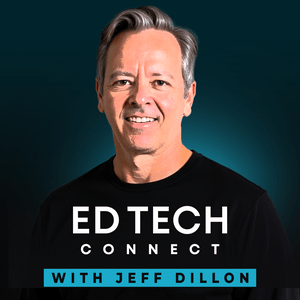
Get the free radio.net app
- Stations and podcasts to bookmark
- Stream via Wi-Fi or Bluetooth
- Supports Carplay & Android Auto
- Many other app features
Get the free radio.net app
- Stations and podcasts to bookmark
- Stream via Wi-Fi or Bluetooth
- Supports Carplay & Android Auto
- Many other app features


EdTech Connect
Scan code,
download the app,
start listening.
download the app,
start listening.




